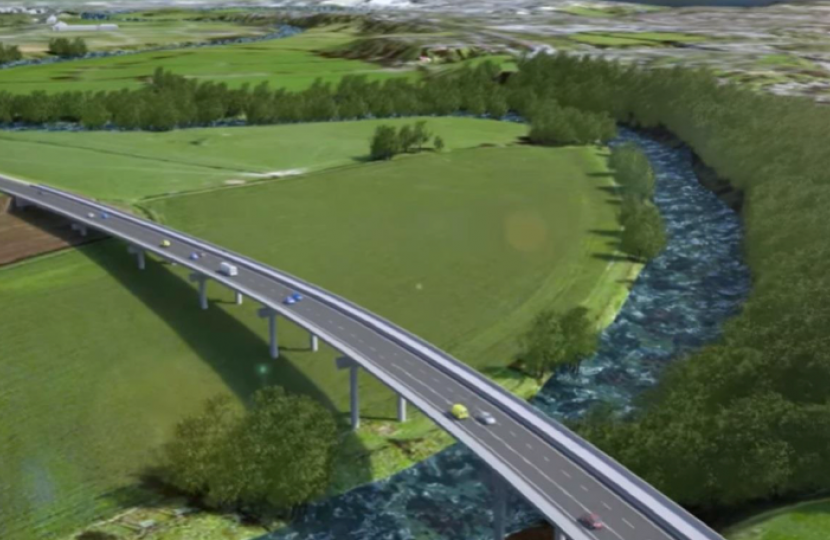The North West Relief Road (NWRR) has always been controversial. It is environmentally destructive. It has been subject to delays and ever increasing costs. It will spend scarce funds that could be used elsewhere in the county. It will promote car travel at the expense of other modes of travel.
Shropshire Council has not produced a business case for the road. That will be produced after the planning application has been approved. It hasn’t assessed whether the road construction will lead to pollution of the water supply for Shrewsbury. That again will come after approval. This is clearly back to front.
Now, to add to the controversies, some councillors have been warned by the council’s legal team that because they voted against the road at Shrewsbury Town Council two-and-a-half years ago they should not vote on the planning application to be considered next Tuesday. For Shropshire Council to seek a legal opinion from barristers on whether councillors can vote is in my experience unprecedented. The council’s lawyers also to seem to have misunderstood the motion agreed at Shrewsbury Town Council in May 2021.
There is a fine line between whether a planning committee member is predetermined to vote in a particular way or simply predisposed to vote for or against. If a councillor has firmly made up their mind in favour, they are predetermined. If they think they might vote in a particular way but are still open to hearing the arguments for or against, they are predisposed. If the councillor is predetermined, they cannot vote or take part in the vote.
The unprecedented warning issued by Shropshire Councill leads to questions. Why did council legal officers seek the advice of a barrister on the NWRR when it had not done so for other large, controversial applications? Why was the council’s barrister briefed on a single vote at Shrewsbury Town Council opposing the road and not on a Conservative resolution to Shropshire Council supporting it?
The essence of the legal argument is that some two hatted councillors that sit on Shrewsbury Town Council and Shropshire Council voted against the road at the town council and the wording of the motion indicated some members of the Northern Planning Committee are predetermined. The motion, submitted by councillor Alan Moseley (Labour), had two sentences:
That this Council is strongly opposed to the creation of the North West Relief Road and hence objects to the current planning application.
This would not bar a town councillor who voted for the motion from voting for or against the planning application when it came for a committee decision at Shropshire Council. The town council was expressing a view. Any view taken would be the council’s view, not that of any individual councillor. It is quite possible for a councillor to vote for a town or parish motion against the road because that is in the best interests of the council, and subsequently vote differently at Shropshire Council because that is in the best interests of the county or because they have received further information. This “two-hatter” position is well established.
It is the second sentence of Alan Moseley’s motion is causing the legals concern:
Furthermore we pledge to do all in our power to oppose any further associated developments.
To quote from the legal advice given by No5 Chambers to Shropshire Council:
“Such a ‘motion’ is not one of simply expressing an opinion – it is a statement to do everything possible to oppose the scheme. That would plainly include voting against the scheme should the opportunity arise.”
You don’t need to be lawyer to recognise that is an incorrect interpretation of the motion passed by Shrewsbury Town Council. The town council said very clearly that it would do everything in its power to oppose any further developments associated with the NWRR. Such developments might, for example, be housing schemes. The town council is not talking about the NWRR but subsequent developments.
It is well established principle that decision makers can only determine a planning proposal based on the application before them. They might suspect, by way of example, that if they approve one house, a subsequent application might come in for a second house. But they cannot take suspicions or even applications they know are being prepared if they not before them at the point of decision.
Shropshire Council’s legals have targeted opposition members with the legal advice from No5 Chambers: Julian Dean (Green Party), David Vasmer (Lib Dem) and Nat Green (Lib Dem). Conservative members of the Northern Planning Committee, who put forward a resolution strongly in favour of the NWRR to Shropshire Council in February 2021, were not singled out for advice.
No5 Chambers states that if councillors do not have an open mind when they approach an application, there could be reputation damage to the council. Yes, of course. But greater reputational damage has been done by this clumsy attempt to restrict which councillors can vote on the NWRR application. It shows every appearance of trying to bulldoze the road through the planning system. It shows every appearance of political bias. That may not be the case but in the terminology of the council’s barristers lack of bias is:
That in the circumstances of the case, a fair minded and informed observer would conclude the same (i.e. there is not the appearance of bias).
As a Man on the Ludlow Omnibus, I believe there is an appearance of bias.
The NWRR application will be discussed at a special meeting of the Northern Planning Committee on 2pm, 31 October. All 64 public seats are booked. The meeting will be streamed live on YouTube.


what happened to democracy in Shropshire?
And who pays the barristers’ fees?
Sounds like HS2.